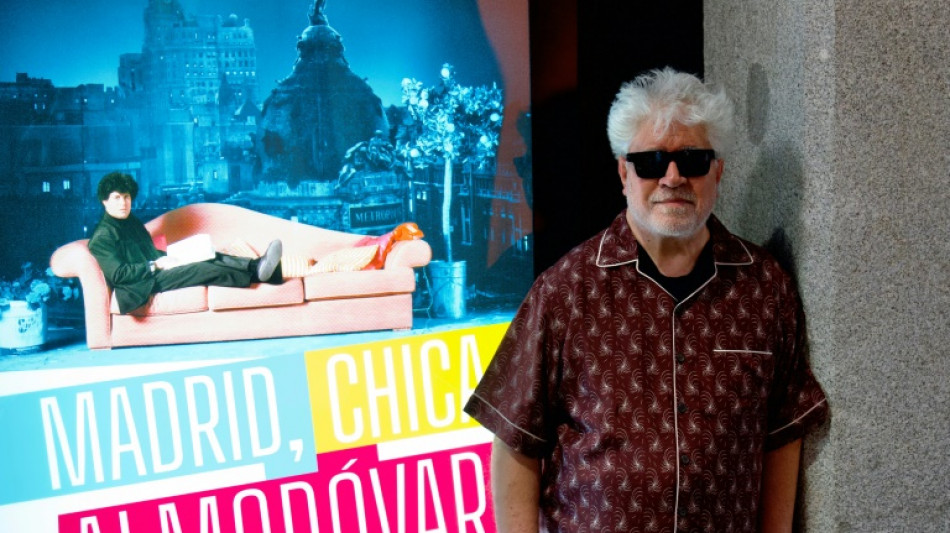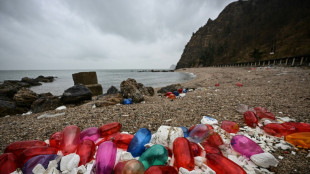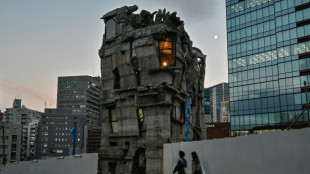
| RBGPF | 100% | 60.1 | $ | |
| CMSC | -0.65% | 24.57 | $ | |
| BCC | -2.76% | 148.41 | $ | |
| BCE | -1.46% | 26.63 | $ | |
| SCS | -1.33% | 13.54 | $ | |
| RIO | -1.53% | 62.03 | $ | |
| RYCEF | -0.29% | 6.78 | $ | |
| GSK | -0.38% | 34.02 | $ | |
| NGG | -0.68% | 62.83 | $ | |
| CMSD | -0.61% | 24.43 | $ | |
| RELX | 0.51% | 46.81 | $ | |
| AZN | -0.06% | 66.36 | $ | |
| JRI | -0.98% | 13.24 | $ | |
| VOD | -0.56% | 8.86 | $ | |
| BTI | 1.01% | 37.71 | $ | |
| BP | -1.24% | 28.96 | $ |

Almodovar's love affair with Madrid explored in new exhibition
Oscar-winning director Pedro Almodovar's decades-long love affair with Madrid is the focus of a new exhibition in the Spanish capital which has appeared in all of his feature films to varying degrees.
"Madrid, Almodovar Girl", which runs until October 20 at the Conde Duque cultural centre, features 200 photos from his 23 movies, as well as notebooks, movie props and the first camera Almodovar bought, a hand-held Super-8.
This year marks the 50th anniversary since Almodovar began his film career in Madrid in 1974 with the release of his first short film.
"The story of Pedro Almodovar and Madrid is a story of requited love, Pedro Almodovar is Pedro Almodovar thanks to Madrid," Pedro Sanchez, the commissioner of the exhibition and author of a book on the director's links to the city, told AFP.
"Almodovar has paid back to Madrid in spades what the city has given him by being his muse," he said, adding that many foreigners' first contact with Spanish culture and Madrid is through Almodovar's works.
A huge chart at the exhibition shows what percentage of the action in each of Almodovar's films takes place in Madrid.
It ranges from just six percent in 2011 drama "The Skin I Live In", about an amoral plastic surgeon who seeks revenge on the young man who raped his daughter, to 100 percent in seven films.
These include his international breakthrough, the 1988 romantic black comedy "Women on the Verge of a Nervous Breakdown".
- Cemeteries and bars -
Almodovar moved to Madrid from a small village in Castilla-La Mancha, an arid and rural region in central Spain, in 1967 during the final years of the dictatorship of General Francisco Franco when he was just 17.
"I have never felt like a stranger here," he has said.
After Franco's death in 1975, Almodovar became a key part of the cultural movement in Madrid dubbed "la movida" which saw artists break the Roman Catholic dictatorship's many taboos.
Sanchez said that like Madrid, Almodovar has a "transgressive, multifaceted, critical, open, fun, cosmopolitan and friendly personality".
The exhibition features a map of Madrid marked with the 272 locations that have appeared in his films.
Spain's most famous director tends to avoid famous landmarks, preferring working-class areas like Vallecas and places such as hospitals, taxis, bars and cemeteries where people go about their daily lives.
One of his most iconic scenes was shot outside the facade of the building housing the exhibition -- the moment in the 1987 film "Law of Desire" where a city street cleaner hoses down Carmen Maura's character on a hot Madrid summer night at her request.
- Adoptive son -
Almodovar is known for using vivid colours, which he has said is "a way of taking revenge" on the grey years of the Franco dictatorship, Sanchez said.
He reproduced his Madrid flat for the 2019 film "Pain and Glory" about an ageing film director, even using some of his armchairs.
When he visited the exhibition before it opened to the public on June 12, Almodovar reportedly said "this is my life".
The 74-year-old won the Oscar for screenwriting for his 2002 movie "Talk to Her", about two men who form an unlikely bond when both their girlfriends are in comas.
He also picked up the best foreign language Oscar for the 1999 movie "All About My Mother" about a woman struggling with the sudden death of her teenage son.
The exhibition ends with a video of part of the speech he gave when Madrid city hall in 2018 declared him to be an "adoptive son" of the city.
"I came mainly to get away from the village, to urbanise a bit and then to go and live in Paris or London, but without realising it, I stayed," he said.
"Now I can say that both me and my characters will continue to live here."
E.Colombo--IM



